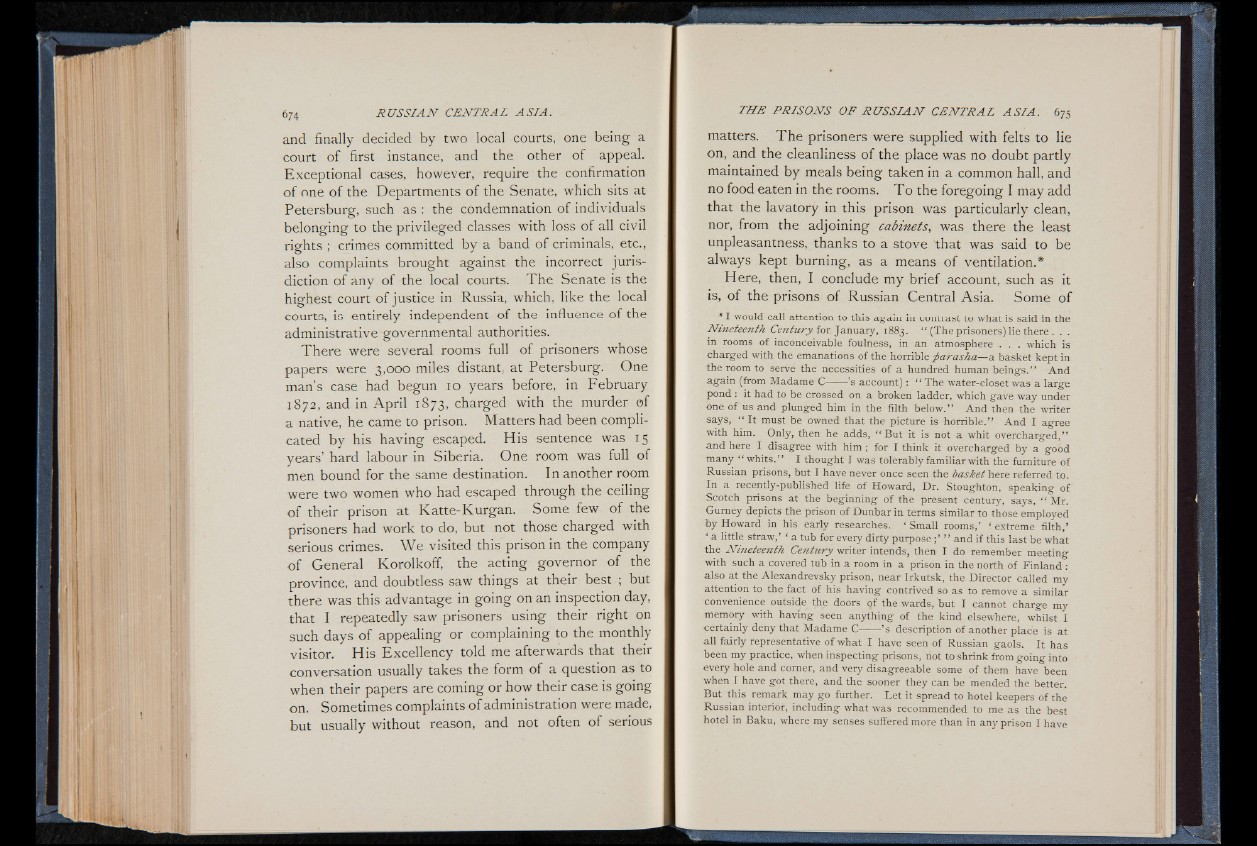
and finally decided by two local courts, one being a
court of first instance, and the other of appeal.
Exceptional cases, however, require the confirmation
of one of the Departments of the Senate, which sits at
Petersburg, such as : the condemnation of individuals
belonging to the privileged classes with loss of all civil
rights ; crimes committed by a band of criminals, etc.,
also complaints brought against the incorrect jurisdiction
of any of the local courts. The Senate is the
highest court of justice in Russia, which, like the local
courts, is entirely independent of the influence of the
administrative governmental authorities.
There were several rooms full of prisoners whose
papers were 3,000 miles distant, at Petersburg. One
man’s case had begun 10 years before, in February
1872, and in April 1873, charged with the murder of
a native, he came to prison. Matters had been complicated
by his having escaped. His sentence was 15
years’ hard labour in Siberia. One room was full of
men bound for the same destination. In another room
were two women who had escaped through the ceiling
o f their prison at Katte-Kurgan. Some few of the
prisoners had work to do, but not those charged with
serious crimes. We visited this prison in the company
of General Korolkoff, the acting governor of the
province, and doubtless saw things at their best ; but
there was this advantage in going on an inspection day,
that I repeatedly saw prisoners using their right on
such days of appealing or complaining to the monthly
visitor. His Excellency told me afterwards that their
conversation usually takes the form of a question as to
when their papers are coming or how their case is going
on. Sometimes complaints of administration were made,
but usually without reason, and not often of serious
matters. The prisoners were supplied with felts to lie
on, and the cleanliness of the place was no doubt partly
maintained by meals being taken in a common hall, and
no food eaten in the rooms. To the foregoing I may add
that the lavatory in this prison was particularly clean,
nor, from the adjoining cabinets, was there the least
unpleasantness, thanks to a stove that was said to be
always kept burning, as a means of ventilation.*
Here, then, I conclude my brief account, such as it
is, of the prisons of Russian Central Asia. Some of
* I would call attention to this again in contrast to what is said in the
Nineteenth Century for January, 1883. “ (The prisoners) lie there . . .
in rooms of inconceivable foulness, in an atmosphere . . . which is
charged with the emanations of the horrible ftarasha— a basket kept in
the room to serve the necessities of a hundred human beings.” And
a ga in (from Madame C ’s a ccoun t): “ The water-closet was a large
pond : it had to be crossed on a broken ladder, which gave way under
one of us and plunged him in the filth below.” And then the writer
says,- “ It must be owned that the picture is horrible.” And I agree
with him. Only, then he adds, “ But it is not a whit overcharged,”
and here I disagree with him ; for I think it overcharged by a good
many “ whits.” I thought I was tolerably familiar with the furniture of
Russian prisons, but I have never once seen the basket here referred to.
In a recently-published life of Howard, Dr. Stoughton, speaking of
Scotch prisons at the beginning of the present century, says, “ Mr.
Gurney depicts the prison of Dunbar in terms similar to those employed
b y Howard in his early researches. ‘ Small rooms,’ ‘ extreme filth,’
' a little straw,’ ‘ a tub for every dirty p u r p o s e ” and if this last be what
the Nineteenth Century writer intends, then I do remember meeting
with such a covered tub in a room in a prison in the north of Finland :
also at the Alexandrevsky prison, near Irkutsk, the Director called my
attention to the fact of his having contrived so as to remove a similar
convenience outside the doors of the wards, but I cannot charge my
memory with having seen anything of the kind elsewhere, whilst I
certainly deny that Madame C ’ s description of another place is at
all fairly representative of what I have seen of Russian gaols. It has
been my practice, when inspecting prisons, not to shrink from going into
every hole and comer, and very disagreeable some of them have been
when I have got there, and the sooner they can be mended the better.
But this remark may go further. Let it spread to hotel keepers of the
Russian interior, including what was recommended to me as the best
hotel in Baku, where my senses suffered more than in any prison I have